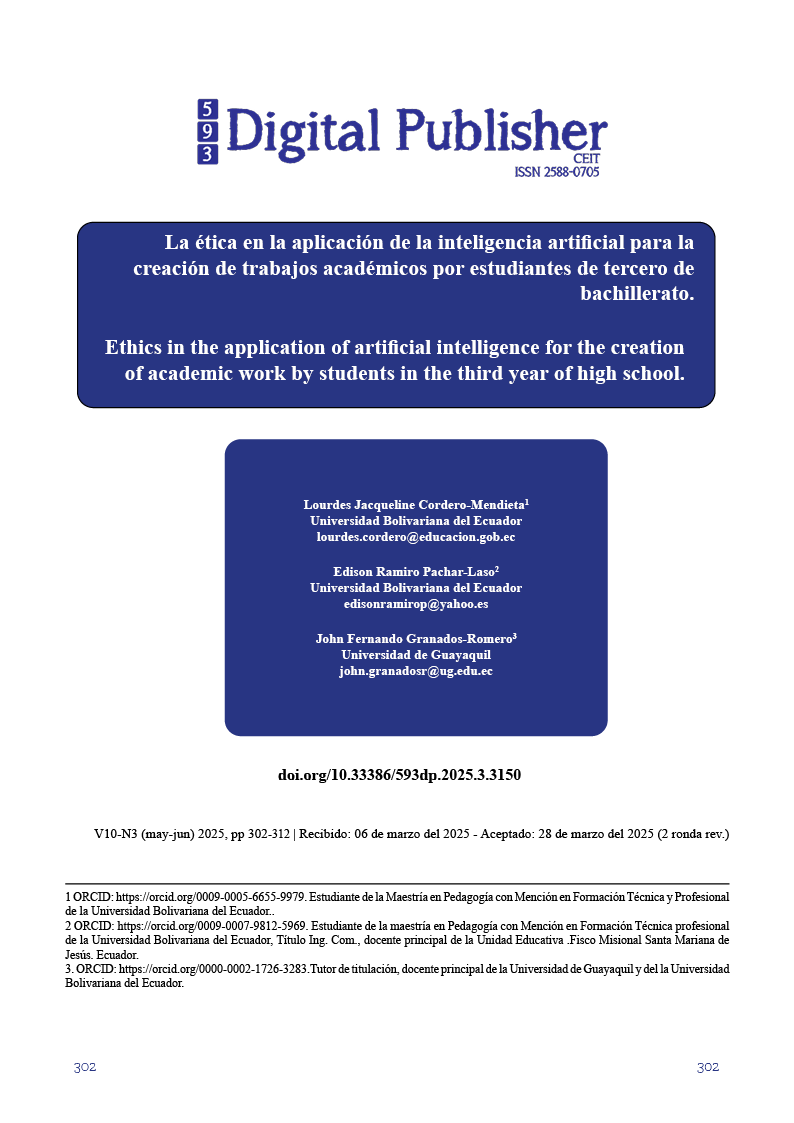This study analyzes the use, implications, and ethical perceptions of artificial intelligence (AI) tools in the development of academic papers among third-year high school students in the city of Cuenca, Ecuador. Physical and digital surveys were applied to 310 students from public, fiscal, and private institutions. It is evident that 90% of students use AI tools such as ChatGPT, Meta AI, among others, for research (33%), idea generation (24%), and text writing (18%). However, 57% of them admit to copying the texts generated by AI verbatim and without modifications, which suggests a high rate of plagiarism and its normalization. Regarding the ethical perception of the use of these tools, 43% believe that using AI negatively affects academic integrity, although a large percentage considers its use ethical depending on how it is applied. It is concluded that, although AI offers many advantages in the educational field, it also presents ethical and pedagogical challenges. It is recommended to implement training on academic ethics, establish clear guidelines for the use of AI, and promote critical thinking to mitigate risks such as plagiarism and dependence on technology
Main Article Content
Abstract
This study analyzes the use, implications, and ethical perceptions of artificial intelligence (AI) tools in the development of academic papers among third-year high school students in the city of Cuenca, Ecuador. Physical and digital surveys were applied to 310 students from public, fiscal, and private institutions. It is evident that 90% of students use AI tools such as ChatGPT, Meta AI, among others, for research (33%), idea generation (24%), and text writing (18%). However, 57% of them admit to copying the texts generated by AI verbatim and without modifications, which suggests a high rate of plagiarism and its normalization. Regarding the ethical perception of the use of these tools, 43% believe that using AI negatively affects academic integrity, although a large percentage considers its use ethical depending on how it is applied. It is concluded that, although AI offers many advantages in the educational field, it also presents ethical and pedagogical challenges. It is recommended to implement training on academic ethics, establish clear guidelines for the use of AI, and promote critical thinking to mitigate risks such as plagiarism and dependence on technology.
Downloads
Article Details

This work is licensed under a Creative Commons Attribution-NonCommercial-ShareAlike 4.0 International License.
1. Derechos de autor
Las obras que se publican en 593 Digital Publisher CEIT están sujetas a los siguientes términos:
1.1. 593 Digital Publisher CEIT, conserva los derechos patrimoniales (copyright) de las obras publicadas, favorece y permite la reutilización de las mismas bajo la licencia Licencia Creative Commons 4.0 de Reconocimiento-NoComercial-CompartirIgual 4.0, por lo cual se pueden copiar, usar, difundir, transmitir y exponer públicamente, siempre que:
1.1.a. Se cite la autoría y fuente original de su publicación (revista, editorial, URL).
1.1.b. No se usen para fines comerciales u onerosos.
1.1.c. Se mencione la existencia y especificaciones de esta licencia de uso.
References
Alfaro-Salas, H., & Díaz Porras, J. A. (2024). Percepciones y Aplicaciones de la IA entre Estudiantes de Secundaria. Revista Docentes 2.0, 17(1), 200-215. https://doi.org/10.37843/rted.v17i1.458
Ayala-Pazmiño, M. (2023). Artificial Intelligence in Education: Exploring the Potential Benefits and Risks. 593 Digital Publisher CEIT, 8(3), 892-899. https://doi.org/10.33386/593dp.2023.3.1827
Baty, P. (2018). Artificial intelligence and academic integrity. Journal of Academic Integrity, 14(1), 1-12.
Baque Guerra, V. E., Zavala O’Brien, M. I., Mendoza Bajaña, V. P., Recalde Villacrés, E. B., Nevares Pacheco, M. D. J., Castillo Rodríguez, N. E., & Barreto Zúñiga, W. W. (2024). Percepciones y experiencias de docentes universitarios sobre la inteligencia artificial: Transformación, ética y desafíos en el uso académico por estudiantes: Perceptions and experiences of university teachers on artificial intelligence: transformation, ethics and challenges in academic use by students. LATAM Revista Latinoamericana de Ciencias Sociales y Humanidades, 5(6). https://doi.org/10.56712/latam.v5i6.3204
Chan, C. K. Y. (2024). Students’ perceptions of ‘AI-giarism’: Investigating changes in understandings of academic misconduct. Education and Information Technologies. https://doi.org/10.1007/s10639-024-13151-7
Chan, C. K. Y., & Hu, W. (2023). Students’ voices on generative AI: Perceptions, benefits, and challenges in higher education. International Journal of Educational Technology in Higher Education, 20(1), 43. https://doi.org/10.1186/s41239-023-00411-8
Gallagher, S. (2017). The ethics of artificial intelligence in education. Journal of Educational Philosophy, 49(2), 143-155.
Holmes, W., Bialik, M., & Fadel, C. (2021). Artificial Intelligence in Education: Promises and Implications for Teaching and Learning. Center for Curriculum Redesign.
Joyzy Pius Egunjobi. (2024). Artificial Intelligence and Academic Writing: A Global Exploration of Students Perceptions and Attitudes. https://doi.org/10.13140/RG.2.2.23790.52800
Kaplan, A. (2016). Artificial intelligence and education: A review of the literature. Journal of Educational Technology Development and Exchange, 8(1), 1-24.
Lancashire, I. (2017). The impact of artificial intelligence on academic writing. Journal of Academic Writing, 7(1), 1-15.
Luckin, R. (2017). Towards Artificial Intelligence-based Assessment Systems. Nature Human Behaviour, 1(3), 1-3. https://doi.org/10.1038/s41562-016-0028
Martínez González, M. A. (2023). Uso responsable de la inteligencia artificial en estudiantes universitarios: Una mirada recnoética. Revista Boletín Redipe, 12(9), 172-178. https://doi.org/10.36260/rbr.v12i9.2008
Mena De La Rosa, R., Cruz-Romero, R., & Silva-Payró, M. P. (2024). Percepción de la inteligencia artificial por estudiantes universitarios como acompañante en el proceso de aprendizaje. European Public & Social Innovation Review, 9, 1-18. https://doi.org/10.31637/epsir-2024-738
Ríos Hernández, I. N., Mateus, J. C., Rivera Rogel, D., & Ávila Meléndez, L. R. (2024). Percepciones de estudiantes latinoamericanos sobre el uso de la inteligencia artificial en la educación superior. Austral Comunicación, 13(01). https://doi.org/10.26422/aucom.2024.1301.rio
Selwyn, N. (2022). Should Robots Replace Teachers? AI and the Future of Education. Polity Press.
UNESCO (2020). Inteligencia artificial en la educación: Retos y oportunidades. Organización de las Naciones Unidas para la Educación, la Ciencia y la Cultura (UNESCO).




